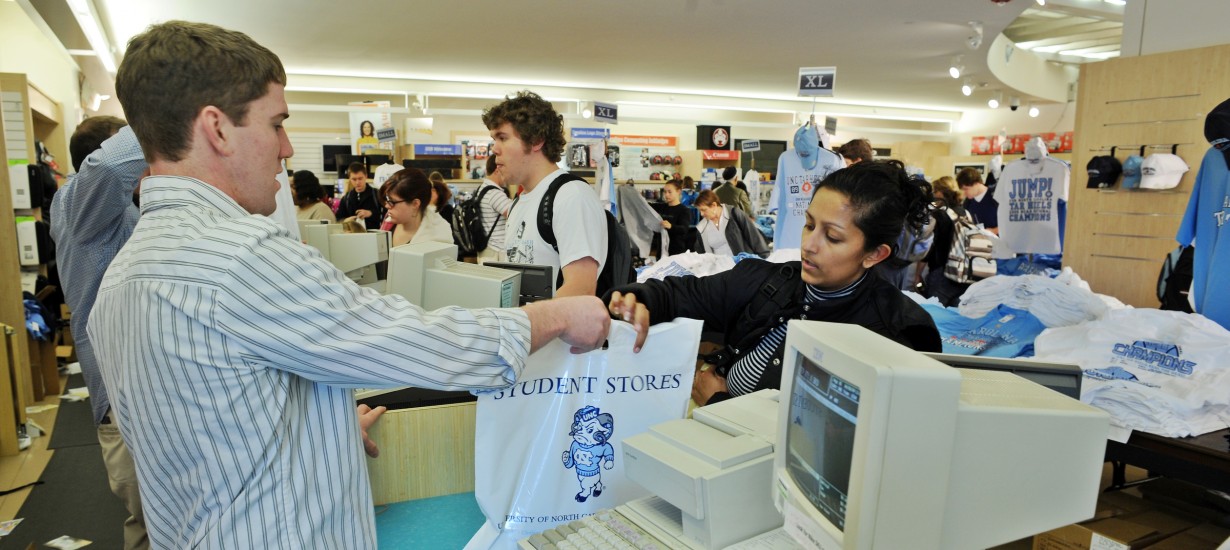UNC Considering Taking Student Stores Private

The University is considering outsourcing Student Stores after receiving a proposal from a company that operates campus retail stores. And that news has been greeted in Chapel Hill with a flood of skepticism from students, faculty and store employees who fear the loss of home-grown service.
Follett, which calls itself the largest campus retailer in higher education, told UNC officials that it could significantly grow the apparel, book and school supplies store’s revenues, all of which go toward scholarships. The University has netted about $400,000 in each of the past five years from the store; Follett says in its proposal that it could make that $3 million a year. Any profits from the store go to scholarships by law.
“We get this offer for that much money, we need to take a look at it,” said Matt Fajack, vice chancellor for finance and administration. “We have a duty to take a look.”
Follett initiated the talks, and UNC expects also to get a proposal from book retailer Barnes & Noble. Follett operates nearly 1,200 campus bookstores nationwide; Barnes and Noble has more than 700.
UNC expects to make a formal request for proposals within the next few weeks. If such a plan went forward, UNC would contract with a company that would take over store operations and assume the profit-loss risk. Follett says it would commit to keeping existing staff and paying them at current salaries for one year. Its proposal says it would invest up to $2.5 million in store renovation. It claims it can save students millions of dollars on course materials and, due to its volume buying, offer attractive prices for used textbooks.
The company’s preliminary proposal says, in reference to the $3 million it could pay to UNC annually, “This payment could be used for building occupancy cost and student scholarships or as the university chooses.” Fajack said he wants to know whether “building occupancy” means the $3 million really would be a net to UNC, and he said UNC would ask for clarification in the formal request for proposal.
The consideration has been greeted with sour notes from the store’s director and his predecessor; at noon on Sept. 30, about 200 students gathered in the Pit in front of the store to support store employees who are solidly against outsourcing. The chair of the University’s Employee Forum told the Board of Trustees that the forum also was against the idea.
“We’ve always been conscious that these lease operations are interested in coming to campus,” said John Gorsuch, director of the stores for the past five years. “You’re exchanging an operation run on the campus for one run by a corporation with shareholders” located elsewhere.
A petition opposing outsourcing on change.org had drawn more than 3,500 signatures by Oct. 5. Author and former faculty member Sarah Dessen ’93 tweeted: “Upset to hear UNC Student Stores may become corporately owned. If you love The Bull’s Head, please consider signing!”
Gorsuch and others are concerned about the fate of 49 state employees who work in the store, which also employs about 200 students. A private company, they say, might not honor state benefits and might not employ as large a staff.
Also, Gorsuch said, the store is charged with providing low-profitability services such as course materials, equipment and uniforms for medical students and special needs of professors. He wondered whether a private company would take on that mission. “If the art department needs a pile of clay, we get them clay,” he said. “We don’t have the option to pick and choose what we will or won’t do.”
The Bull’s Head bookstore was a particular focus of those concerned, who worried that loss of a local operation might reduce access to faculty-written books and other literature the store traditionally has carried.
Fajack said his office is considering whether the Bull’s Head could be kept out of any outsourcing. He said he wants to know how well a private company would adhere to the Bull’s Head’s tradition of offering books by UNC faculty and “great literature.”
Gorsuch said Bull’s Head is not a money maker, and he wondered how it could be run successfully separately.
Fajack said the appeal of outsourcing was an increase in the profits for scholarships, and he cited the ability of a company such as Follett to buy apparel and books cheaper with the strength of volume.
The downside, Fajack said, is “what are they going to do to retain our employees?” And, he added, “there’s always the risk you get that commercialized feel.”
He said he has personally observed what he called Follett’s successful operations at the University of Florida, Stanford University and the University of Notre Dame. (In North Carolina, Follett operates the stores at UNC-Asheville, N.C. Central, Elizabeth City State, Fayetteville State, Winston-Salem State and the private Wake Forest University. Barnes & Noble runs stores at UNC-Charlotte, UNC-Greensboro and UNC-Wilmington.)
Over the past 10 years, UNC’s Student Stores has generated $6.65 million in profits for scholarships. Over the past 60 years, that total is $27.5 million. Gorsuch said the numbers were down somewhat in recent years because the store has had to pay debt service on a recent major renovation.
The store is celebrating its 100th birthday this year, and Bull’s Head is 90 years old.
The University currently outsources operation of campus food service and the operation of The Carolina Inn. Fajack said that while there are no immediate plans for other privatization, other services could be considered “if we can retain whatever service that is and keep the employees.”
He said, for instance, that parking services, recently outsourced at Ohio State University, likely would not be a good fit for UNC because it is not an urban campus.
Although the trustees are being kept apprised of the situation, their approval is not required to move the store to a private operator.
